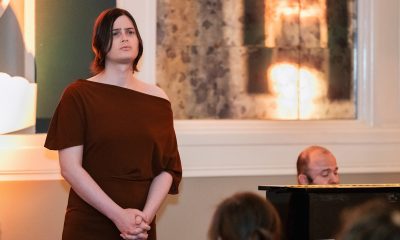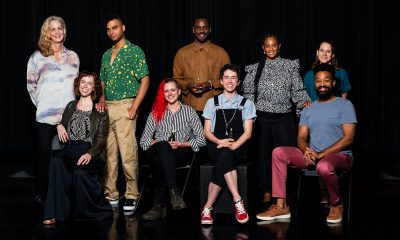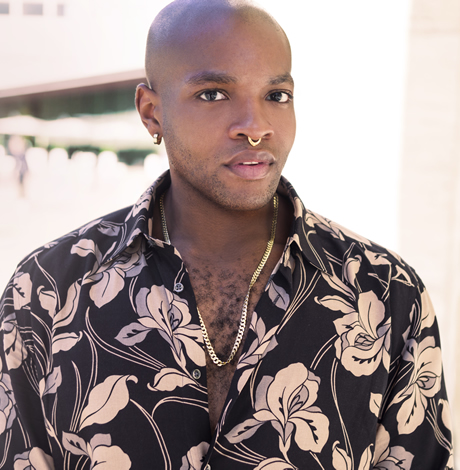Arts & Entertainment
American visionary
Opera’s new artistic director focuses on homegrown repertoire
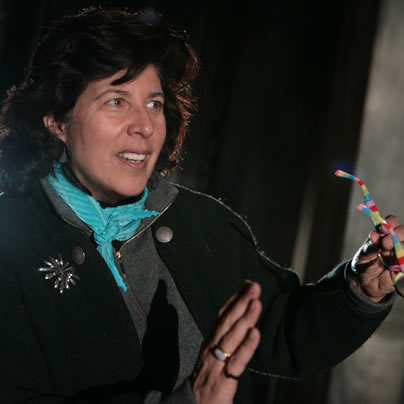
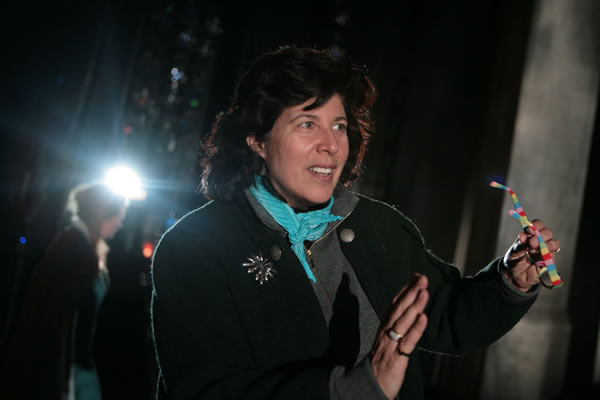
Francesca Zambello, Washington National Opera’s new artistic director, is seen here in a photo from 2007 when she directed the company’s Americanized version of Wagner’s ‘Die Walküre. (Photo courtesy Washington National Opera)
Opera in the Outfield
Saturday
Gates open at 5 p.m., opera begins at 7 p.m.
Nationals Park
1500 South Capitol St., SE
Free
kennedy-center.org/wno
Washington opera audiences have always known that former artistic director Placido Domingo’s tenure with the company provided an incredible boost to the capital’s cultural scene. The tenor’s long performance career speaks for itself, never mind his respectable dabbling in conducting and even stabs at baritone roles at an advanced age; add to that his steerage of Washington National Opera onto an increasingly international platform and it was easy to wonder who could possibly fill the role after his departure.
Longtime opera and theater director Francesca Zambello, a lesbian, assumed the artistic directorship on the first of this year and she comes with a strong pedigree of her own. From the Metropolitan Opera to Milan’s famed La Scala and Russia’s Bolshoi, Zambello has made a serious stamp in the opera world over decades of work that has garnered her high accolades, including the French government’s Chevalier des Arts et des Lettres and the Russian Federation’s medal for service to culture.
Now, traveling back and forth between the New York City home she shares with her wife and their 4-year-old son, and her new residence in Georgetown, she says she’s ready to take Washington National Opera in a direction befitting its name and status in the American cultural landscape.
“We’re taking ‘national’ seriously,” Zambello says. “Focusing more on American artists, more new works and contemporary operas. That’s a big change for the company.”
The past few years have seen simultaneously exciting and predictable seasons at Washington National Opera. Big name artists — Renee Fleming, Patricia Racette, the up-and-coming Vittorio Grigolo — were often saddled with productions that hewed closely to creaky, early 20th-century performance idioms.
“We’re responding to the time and the place,” Zambello says of the company now. “Why shouldn’t we be unique and speak to D.C.? We should relate to who we are and where we are.”
Although Zambello’s directing history with Washington National Opera encompasses repertoire classics like Wagner’s famed Ring operas, her first offering as artistic director is this spring’s “Show Boat,” the Jerome Kern-Oscar Hammerstein operatic musical now playing the Kennedy Center and being simulcast live at Nationals stadium Saturday.
“There are a lot of great issues to explore with ‘Show Boat’ — racism, misogyny, civil rights,” she says, explaining that bringing this production to the D.C. audience is a way to honor the locale, something she plans to continue during her first full season, which begins next September with “Tristan und Isolde.”
YET, IT’S THE FOCUS on newer works and the development of an American repertoire that stands out in Zambello’s vision for the company. Old-school audience members can look forward to the season opener as well as Zambello’s own version of Verdi’s “La Forza del Destino” and a “L’Elisir D’Amore” later in the year. But those curious about opera’s evolution with an American voice will be frothing at the mouth over the Washington-premiere of Jake Heggie’s well-acclaimed “Moby Dick.”
“I’ve decided that every new work that we do must relate to something that is American — story, subject matter, composer, librettist. I think [“Moby Dick”] is a good way to lead us to the more serious issues. In the future, we’re going to see operas that touch on themes like capital punishment, the civil war, terrorism, themes in our lives that we can relate to.”
As part of Washington National Opera’s new direction, next year will also be a sea change for the boys’ club feeling that historically pervades the opera world. While women are objects of adulation when they’re on stage swooning with consumption or jumping to their deaths, it’s rare to see women leading the players and companies. The 2013-14 season in Washington features women conductors, plus the premiere of Jeanine Tesori’s family opera “The Lion, the Unicorn and Me.”
“I’ve been doing this a long time,” Zambello says, adding that she did suffer at the hands of misogynist colleagues. “People don’t want to hire you. They say you’re this or you’re that — if a guy did that, they wouldn’t say that. There’s still not a lot of women running any big company; this would be about the biggest right now.”
“She has a very clear view of what she wants,” says Michael Todd Simpson, who plays the male lead Gaylord Ravenal in “Show Boat.” He first started working with Zambello as a last-minute replacement for the baritone role Escamillo in her production of “Carmen” in Sydney, Australia — a role he played again under her watchful eye three more times from China to upstate New York.
He describes what the initial audition process was like. “Francesca said, ‘Well, the first thing you need to do is lose some weight,’” he says, laughing. “She is bold like that. She has a clear vision for every aspect of the show. She’s one of those directors that knows what works and what doesn’t.”
Simpson says that for “Show Boat” Zambello auditioned everyone, right down to the chorus roles to make sure they had what it takes to bring her vision to life.
“When you have that level of detail across the board, when you walk on stage, you feel like you’re actually in the scene,” he says.
Zambello promises that Washington audiences, both hardcore opera aficionados and newbies to the art, can expect to see a range of offerings, yet all will spotlight a “contemporary approach.” Her “Show Boat,” with a large cast, vivid staging and strong dance numbers, is a primary example of what she means and perhaps envisions for the effect opera can have on audiences.
“[Show Boat] spoke to people about political and social issues,” she says of the work’s groundbreaking history in American theater. “It provided entertainment, it was something for everyone. Being here in Washington gives us a raison d’etre to really respond to the best of America.”

Team DC, the umbrella organization for LGBTQ-friendly sports teams and leagues in the D.C. area, held its annual Night of Champions Awards Gala on Saturday, April 20 at the Hilton National Mall. The organization gave out scholarships to area LGBTQ student athletes as well as awards to the Different Drummers, Kelly Laczko of Duplex Diner, Stacy Smith of the Edmund Burke School, Bryan Frank of Triout, JC Adams of DCG Basketball and the DC Gay Flag Football League.
(Washington Blade photos by Michael Key)




















The 2024 National Cannabis Festival was held at the Fields at RFK Stadium on April 19-20.
(Washington Blade photos by Michael Key)
















Covering the @NatlCannaFest at RFK Stadium for @WashBlade . Stop by the LGBTQ+ booth and pick up a paper if you are here. pic.twitter.com/is7hnsaPns
— Michael Patrick Key (@MichaelKeyWB) April 20, 2024
Theater
‘Amm(i)gone’ explores family, queerness, and faith
A ‘fully autobiographical’ work from out artist Adil Mansoor

‘Amm(i)gone’
Thorough May 12
Woolly Mammoth Theatre
641 D St., N.W.
$60-$70
Woollymammoth.net
“Fully and utterly autobiographical.” That’s how Adil Mansoor describes “Amm(i)gone,” his one-man work currently playing at Woolly Mammoth Theatre.
Both created and performed by out artist Mansoor, it’s his story about inviting his Pakistani mother to translate Sophocles’s Greek tragedy “Antigone” into Urdu. Throughout the journey, there’s an exploration of family, queerness, and faith,as well as references to teachings from the Quran, and audio conversations with his Muslim mother.
Mansoor, 38, grew up in the suburbs of Chicago and is now based in Pittsburgh where he’s a busy theater maker. He’s also the founding member of Pittsburgh’s Hatch Arts Collective and the former artistic director of Dreams of Hope, an LGBTQ youth arts organization.
WASHINGTON BLADE: What spurred you to create “Amm(i)gone”?
ADIL MANSOOR: I was reading a translation of “Antigone” a few years back and found myself emotionally overwhelmed. A Theban princess buries her brother knowing it will cost her, her own life. It’s about a person for whom all aspirations are in the afterlife. And what does that do to the living when all of your hopes and dreams have to be reserved for the afterlife?
I found grant funding to pay my mom to do the translation. I wanted to engage in learning. I wanted to share theater but especially this ancient tragedy. My mother appreciated the characters were struggling between loving one another and their beliefs.
BLADE: Are you more director than actor?
MANSOOR: I’m primarily a director with an MFA in directing from Carnegie Mellon. I wrote, directed, and performed in this show, and had been working on it for four years. I’ve done different versions including Zoom. Woolly’s is a new production with the same team who’ve been involved since the beginning.
I love solo performance. I’ve produced and now teach solo performance and believe in its power. And I definitely lean toward “performance” and I haven’t “acted” since I was in college. I feel good on stage. I was a tour guide and do a lot of public speaking. I enjoy the attention.
BLADE: Describe your mom.
MANSOOR: My mom is a wonderfully devout Muslim, single mother, social worker who discovered my queerness on Google. And she prays for me.
She and I are similar, the way we look at things, the way we laugh. But different too. And those are among the questions I ask in this show. Our relationship is both beautiful and complicated.
BLADE: So, you weren’t exactly hiding your sexuality?
MANSOOR: In my mid-20s, I took time to talk with friends about our being queer with relation to our careers. My sexuality is essential to the work. As the artistic director at Dreams of Hope, part of the work was to model what it means to be public. If I’m in a room with queer and trans teenagers, part of what I’m doing is modeling queer adulthood. The way they see me in the world is part of what I’m putting out there. And I want that to be expansive and full.
So much of my work involves fundraising and being a face in schools. Being out is about making safe space for queer young folks.
BLADE: Have you encountered much Islamophobia?
MANSOOR: When 9/11 happened, I was a sophomore in high school, so yes. I faced a lot then and now. I’ve been egged on the street in the last four months. I see it in the classroom. It shows up in all sorts of ways.
BLADE: What prompted you to lead your creative life in Pittsburgh?
MANSOOR: I’ve been here for 14 years. I breathe with ease in Pittsburgh. The hills and the valleys and the rust of the city do something to me. It’s beautiful, it’ affordable, and there is support for local artists. There’s a lot of opportunity.
Still, the plan was to move to New York in September of 2020 but that was cancelled. Then the pandemic showed me that I could live in Pittsburgh and still have a nationally viable career.
BLADE: What are you trying to achieve with “Amm(i)gone”?
MANSOOR: What I’m sharing in the show is so very specific but I hear people from other backgrounds say I totally see my mom in that. My partner is Catholic and we share so much in relation to this.
I hope the work is embracing the fullness of queerness and how means so many things. And I hope the show makes audiences want to call their parents or squeeze their partners.
-

 District of Columbia4 days ago
District of Columbia4 days agoNew D.C. LGBTQ+ bar Crush set to open April 19
-

 District of Columbia5 days ago
District of Columbia5 days agoReenactment of first gay rights picket at White House draws interest of tourists
-

 Arizona5 days ago
Arizona5 days agoAriz. governor vetoes anti-transgender, Ten Commandments bill
-

 South America3 days ago
South America3 days agoDaniel Zamudio murderer’s parole request denied

